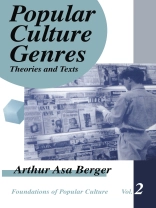Witty and accessible, Popular Culture Genres is a fascinating study of genres and genre criticism. Author Arthur Asa Berger empowers readers to make their own analysis by providing the methods and examples of good criticism. Part I deals with genres from a critical perspective, asking questions such as: How do the conventions of different genres affect the creation and production of texts and the audiences of those texts? Do certain genres have significant social and political implications? And, how do genres evolve? Part II takes a look at five ‘classic’ popular texts (in both their novel and film versions). Viewing these works in the context of their respective genres is not only instructive in nature but captivating reading as well.
Inhoudsopgave
PART ONE: THEORIES
On the Structure of Genres
Propp, de Saussure and the Narrative
Formulas and Texts
Genre Theory
Genre, Society and Culture
The Classical Mystery
A Case Study
PART TWO: TEXTS
Murder on the Orient Express
f003 The Maltese Falcon
The Hard-Boiled Detective Novel
f003 Dr No
f003 War of the Worlds
Frankenstein
The New Prometheus
Conclusions
Over de auteur
Arthur Asa Berger is Professor Emeritus of Broadcast and Electronic Communication Arts at San Francisco State University, where he taught between 1965 and 2003. He has published more than 100 articles, numerous book reviews, and more than 60 books. Among his latest books are the third edition of Media and Communication Research Methods: An Introduction to Qualitative and Quantitative Approaches (2013), The Academic Writer’s Toolkit: A User’s Manual (2008), What Objects Mean: An Introduction to Material Culture (2009), Bali Tourism (2013), Tourism in Japan: An Ethno-Semiotic Analysis (2010), The Culture Theorist’s Book of Quotations (2010), and The Objects of Our Affection: Semiotics and Consumer Culture (2010). He has also written a number of academic mysteries such as Durkheim is Dead: Sherlock Holmes is Introduced to Sociological Theory (2003) and Mistake in Identity: A Cultural Studies Murder Mystery (2005). His books have been translated into eight languages and thirteen of his books have been translated into Chinese.












